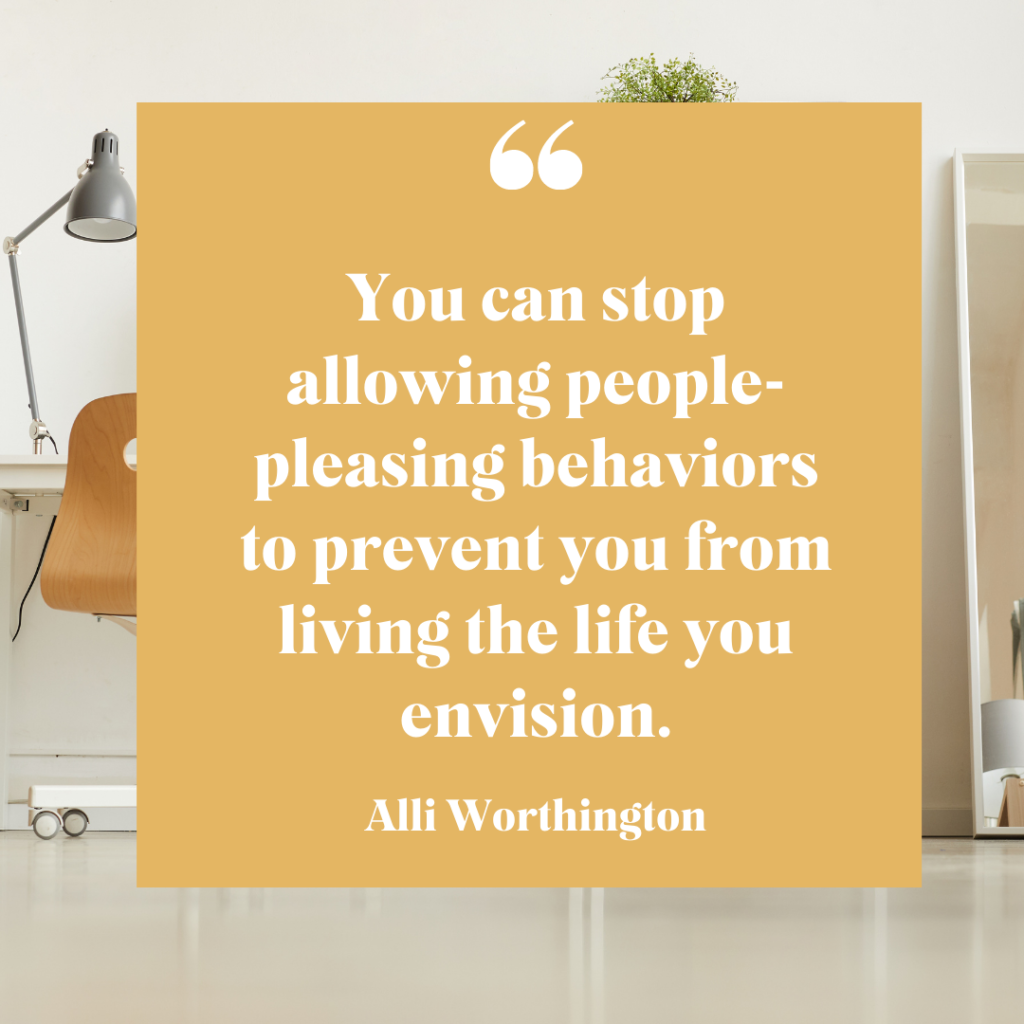You know building your brand is a crucial step to crafting your dream business. This workbook is designed with you in mind to simplify those steps.
Create a Course is Open!
5 Ways to Stop Self-Sabotage

Do you ever feel like you’re on a hamster wheel and you just can’t get off? When you’re on the hamster wheel, your little feet keep running in the same pattern, following your line of sight, no matter how you try to escape. It has to be tiring for the hamster because it definitely gets old to watch after a while.
Hamsters can suffer from wheel addiction when it’s the only tool in their cage, and the same is true for you. Self-sabotage refers to behaviors or thought patterns that you constantly return to which simultaneously prevent you from doing what you want to do.
Unfortunately, like hamsters, you can sabotage yourself by continuing to choose the one tool, or strategy, you’ve learned to rely on. You continue to choose that strategy even when you know it’s no longer helping and you have a desire to get off.
What are those self-sabotaging strategies? They can be:
- Perfectionism
- Negative self talk
- Avoidance
- Aggression
- Passive-aggressive behaviors
- Controlling behaviors
- Social withdrawal
- Self medication
- Fear of failure
One of the reasons self-sabotage is frustrating is because it contradicts your actual values. As much as you like to pretend that it’s something that just happens, that’s not true. Self-sabotage is, in fact, a reflection of choice. It’s heartbreaking to observe and experience, but I have good news. You can break the cycle.
It’s time to figure out your behavior patterns to get ahead of them. The following solutions will help you stop self-sabotaging if you incorporate them into your life. You don’t have to continue to war with yourself any longer.

1. Stop giving perfectionism its power
Could your perfectionism be an even greater disguise for an addiction to approval that you’ve developed and masked over the years? Let’s rip the bandaid off and admit that it feels great to hear others admire how impressive you are. It’s human nature, and you don’t have to feel bad about that. You do need to be aware of it, though.
I want you to reflect on how much priority you’ve assigned to other people’s opinions when you prepare to do something new. High-performing individuals become conditioned to expect others’ approval, but I want you to remember that your value is not conditional.
You’re doing great work. However, that work will continue to be sabotaged if you’re a perfectionist. As I’ve shared before, when you chase perfection, you set yourself up for disappointment. All too easily, perfectionism is used as a form of procrastination.
I recognize that your perfectionism may be grounded in the fear of looking incompetent, but you have to get out of your head. There will always be someone who will know more than you, but there is also someone who will know less and be interested in learning from you. You don’t know what others know.
It’s true that you can do your research, hire a coach, and identify your target audience. However, expertise will come with experience. There are some things that you just won’t learn until you begin to implement the strategies you’ve begun preparing to incorporate into your business.
When I first started coaching, I didn’t feel I was very helpful. However, my clients kept coming back. My coach helped me learn that I couldn’t take my clients’ knowledge for granted. The same is true for you.
Don’t assume what your ideal clients know. Just begin to serve them and start learning how to problem solve through the art of failing fast.
Failing fast is the practice that ensures you make little mistakes early and learn from them quickly. It leads you to start demonstrating mastery much more quickly than had you just waited to begin. Let’s face it, perfectionism is not the same as doing your best. It’s a misnomer for excellence. You can’t serve others excellently until you start failing fast and learning faster.
Failure is a part of growth. You can implement these seven steps into your day to stop perfectionism if you’re ready.

2. Stop allowing people-pleasing behaviors to prevent you from living the life you envision
How often do you put other people’s priorities above your own? It’s time to check those feelings you’re attempting to avoid to please others. You may struggle as a people pleaser because you feel an unnecessary sense of obligation or because you have a fear of being left out. Either way, that people-pleasing behavior is failing you.
People-pleasing will lead to stress, burnout, shallow relationships, and consistent feelings of frustration. Once you choose yourself and the life you want to live, you will begin to set boundaries that support your goals. Get in touch with yourself and consult your schedule before making commitments.
People-pleasing behaviors often result from a lack of authenticity on your part. Begin taking time before you engage with those with whom you feel insecure, before you respond to a request, or before you start taking initiative to lead a new endeavor. When you learn to check in with yourself and become connected to your true interests and goals, you’ll begin to act from an authentic place.
Try waiting at least 2 hours before responding to a request for your time. When you lengthen the time between the request and the reply you give, you’ll be more cautious about the opportunities you accept. Telling someone that you’ll get back to them will allow additional space and may even help you decline more confidently than you would in person.
Remember, whenever you say yes to other people’s priorities, it’s likely that you’re saying no to your own. It’s time for you to stop acting reactively. Become more proactive and prioritize the goals you believe are life-giving. Finding opportunities to move your goals forward will make saying no to others a lot easier.

3. Regulate your emotions and stop self-medicating
Emotions can teach you about yourself if you let them. Sadness can teach you more about what you believe to be important. Frustration can help you recognize that you’re growing silent about something meaningful to you, and happiness can reveal that you’ve started focusing on the moment in front of you.
Unfortunately, emotions can also teach others important things. Your emotions have the power to teach others how to distance themselves from you if you don’t learn to regulate them. And no one wants to be separated from the people they love.
For many people, choosing to self-medicate seems like a quick fix, but it only exacerbates the problem. People self-medicate in a variety of ways that may take time to recognize, like shopping, watching Netflix, or mindlessly scrolling social media.
Choosing to see a good therapist will help you get ahead of those behaviors, though (and the desire to escape them). Self-medication, if left unchecked, can lead to addiction, worsening mood disorders, and other chaos in your home and work-life balance.
When you begin to allow your emotions to teach you about yourself, you can become aware of the triggers that lead to self-medication. Those triggers will also help you identify the solution, but it will take time. It will also require you to slow down and admit your need for help.
Psychology Today defines emotional regulation as the ability to exert control over one’s own emotional state. No one wants to be seen as inconsistent. Thankfully, there are many things you can do to regulate your emotions.
- Start with breathwork. Focus on your breathing when you feel your heart rate increasing. It will help to take your mind off of your immediate reaction so you can show up as the person you want to be.
- Incorporate movement into your day. Plan a midday walk or attend an evening dance class so you can avoid shutting down. Exercise will help you remain present for some of the moments that may require more emotional energy.
- Journal about what you’re feeling. Don’t worry: you don’t need a lot of time to do this. You can write a list of emotions and adjectives that describe how you feel in bullet form. You can also choose to write longer entries if that’s what you enjoy. Processing your emotions or simply participating in a brain dump will help you share what you’re feeling more successfully when the time’s right.
- See a therapist. It’s more convenient than ever to find a quality therapist who can help you navigate the pressures of daily life. There are apps to help you get the help you need without the inconvenience of leaving your office or home. Your insurance can also help you identify therapists in your neighborhood, and you owe it to your family, your business, and, most importantly, yourself to get help.

4. Check for a misplaced sense of loyalty
Loyalty is admirable. It’s an important characteristic that enriches our relationships and ensures our businesses are successful for long periods. However, I want to caution you against blind loyalty that can compromise your vision for the life you want to lead.
Loyalty has the power to compromise your vision when you become more loyal to the people in your life than the purpose you have. Now, I am not telling you to desert your family in your desperation to build your business. I am telling you that there may be opportunities for growth you’re missing out on through a misplaced sense of loyalty.
You may have a misplaced sense of loyalty if you have ever:
- Wondered if you could join a new friend group without hurting your best friend’s feelings
- Thought that you may be looked upon as a copycat or an imposter when you attempt new business ventures
- Lost out on new partnerships and adventures because you believed it would limit your opportunities
You don’t live life in isolation. Your relationships, partnerships, and business ventures should enhance and enlarge your opportunities to serve others more effectively. Contracts that include non-compete agreements are understandable, but your fears of expanding your influence outside of that are irrational and unhelpful.
Passive-aggressive behaviors often result from deep-rooted issues that have gone unchecked and ignored. At the root of these behaviors, you can find anger, sadness, or resentment associated with jealousy.
These behaviors usually arise in response to a lack of action, and they can emerge over time when you experience a misplaced sense of loyalty, especially if that loyalty doesn’t seem to be reciprocated.
Passive-aggressive behaviors can then sabotage your relationships by causing the distance to grow between yourself and those with whom you really want to enjoy healthier relationships.
To respect the relationship, you must begin to identify a healthy outlet and be mindful of the intended results you truly desire. It will help you refrain from further causing others to suffer for your discontent.
5. Say goodbye to micromanaging others
People often begin to self-sabotage themselves when they feel overwhelmed and stressed out by the number of responsibilities they assume. Stress can have a severe impact on your health, mood, and your behavior.
Individuals who feel stressed naturally want to find relief. However, self-sabotage usually prevents you from attaining the relief you need and crave.
The first thing you’re going to have to do is assume fewer responsibilities and recognize what is within your locus of control. Locus of control is a psychological term that refers to the belief others have about what they control in the situations and experiences that affect their lives.
Some decisions are beyond you, and that thought can provide relief if you allow it. You do not have to ruminate on those things beyond your reach. Recognizing what is in your locus of control can bring you a sense of peace as you learn to prioritize those things you can accomplish.
Enjoying the ability to prioritize what is within your locus of control is a lot easier to achieve when you have an efficient and transparent project management system.
Identify a method that your team members can use to report their progress, and it will help you stop micromanaging them. As a result, you’ll feel free to stop taking on more than you have time for, and it will help others recognize the importance of accountability.
Lastly, recognize that you have the opportunity to grow by developing trust in your team members. As you rise to the level of coach and you help them become more competent at new jobs, they will grow as well.
You cannot lead your team beyond the distance you have traversed yourself. Make up your mind to enjoy the new challenge before you and focus on that which really needs your attention.
If you find that you’re stressed and you’re ready to turn your attention away from micromanaging others to the areas that need to be addressed, you can start to:
- Engage in regular exercise and physical activity
- Schedule an appointment with your therapist and/or medical doctor
- Spend more time with your family
- Find activities that make you feel lighthearted and encourage laughter
It may sometimes feel counterproductive, but to get new results, you’ve got to try new things.
When healthy relationships and partnerships are secure, they will strengthen your ability to enjoy success in a variety of areas. If you’re a mother and want to join a group of women who are helping change the world as they raise their children and win the war with self-sabotage, I want to invite you to join my new Facebook group by clicking here.
Unfortunately self sabotage is a hard pattern to break, and you’ll need accountability. Sign up for my Friday Devotionals here, and I’ll share practical tips and prayers that will lead you to set priorities from a place of peace.

